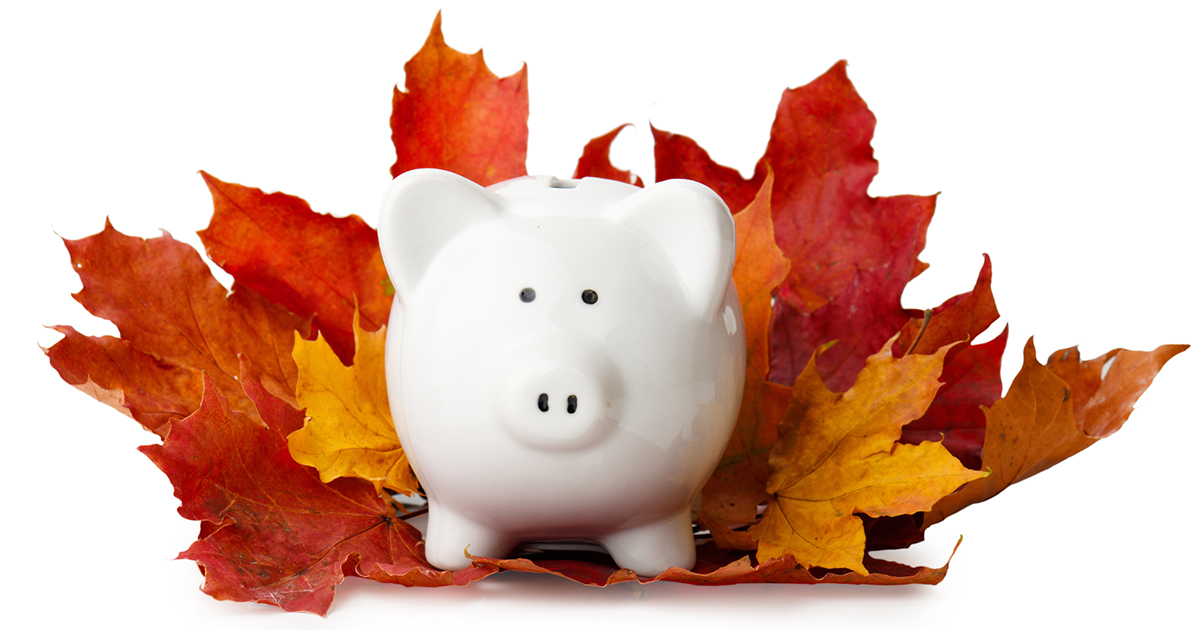When the first cases of COVID-19 were detected in the U.S. in January, few could’ve imagined masks and social distancing still being part of our lives when fall rolled around. But despite being many months into the pandemic, the U.S. is still experiencing health and economic hardship, and many people are looking for creative ways to get their finances back on track and end 2020 on the right financial foot. Read our 10 money-saving tips to give your savings account a boost this fall and pick one or two to incorporate into your life today!
- Pay your savings account first. Some people wait to transfer money into their savings account until the end of the week or month. By making “Savings” a line item in your budget, you force yourself to put that money into savings right when you get paid, making it less likely you’ll spend that money on something else. Out of sight, out of mind!
- Go ahead and shop around. Recurring charges make things easier and can help you avoid missing a payment. But if you’re not revisiting automatic payments, such as your phone, insurance and cable TV bills regularly, you may be missing a savings opportunity. Maybe you got a great rate on those services 12 months ago, but a lot can change in a year—as 2020 continues to prove to us! Conducting an informal financial audit and shopping around for better rates might lead to more savings than you’d expect.
- Don’t leave money on the table. Many employers will match your 401k contribution, up to a certain percent of your salary. But not all workers take advantage of this. If your employer matches your 401k contribution up to 4% of your salary, but you are only contributing 2%, you’re essentially missing out on part of your work compensation. If you’re able to, bump your personal 401k contribution up to 4%, allowing you to take full advantage of the compensation your employer is willing to provide.
- Ignore your bonus or raise. Yes, Clark Griswold, we know it’s an exciting idea to spend your holiday bonus on a backyard swimming pool. But sometimes, especially in times of financial hardship, tucking that bonus away for a rainy day isn’t a bad idea. If you were doing well financially before you received the bonus, dropping that bonus check in your savings and forgetting it ever existed will help you out in the future, should money get tight.
- The best savings tricks are ones you don’t even notice happening. You may have heard of apps that round up your purchases to the nearest dollar and put the difference into a savings account. But did you know this helpful feature is available at Verve? Verve Round Up helps you add money to your savings with every debit card purchase. A few cents may seem insignificant, (you likely won’t even notice the difference), but with this method, slow and steady wins the race.
- Don’t hold onto your money. If your savings tactics include tucking money away in an envelope or the classic “under your mattress” technique – please stop. Not only does doing so put you at a higher risk of having that money lost or stolen, you’re missing out on even more savings. Money market and share certificate accounts earn interest, helping you save additional money just by having your money in there. If your mattress gives you money for storing your savings there, please let us know where you purchased this magic mattress because we want one too.
- You can’t shop any more local than your own home. Unless you are a minimalist, you probably have items that you’ve forgotten about stored throughout your house. Whether it’s clothes, groceries or odds and ends, take a little shopping trip through your own home before you run to the store next. Instead of buying that third bag of flour or another bottle of lotion, dig into the back of your cupboards and closets to make sure you don’t already have those items on hand.
- Barter instead of spend. While fur traders might come to mind when you hear the terms barter or trade, bartering is a very valid money-saving option. If your friend is good at cutting hair, why not offer a few hours of babysitting in exchange for a haircut. If you want a larger network of fellow barterers in your area, check out websites like TimeBanks and Swap Right for opportunities in your community.
- Cutting excess spending is just common sense. We realize that “spend less” is a no-brainer, but it should be on every money-saving list. If you’re going to consider saving your bonus or spending time shopping around for better car insurance rates, you might as well determine what other monthly expenses can be trimmed. Taking a quick look at your bank statements can quickly highlight areas where money might be spent frivolously.
- Take time to give back. You probably won’t see a direct link between volunteering and your bank account growing, but the indirect benefits could lead to future success. Studies show that volunteering leads to reduced stress, prevents feelings of isolation, increases confidence, and can help combat depression. Taking care of yourself mentally can help you set future goals and focus on a game plan to meet those goals. Plus, the more time you spend doing volunteer work, the less time you’ll have to spend your money unwisely. And let’s face it, taking a little more time these days to help your fellow neighbor is time well spent.
If you’re excited about starting your savings journey and ready to end 2020 with a bang, but are still unsure where to start, let us help! Meet with one of our team members virtually or in-person (limited availability, by appointment only).






 Federally Insured by NCUA |
Federally Insured by NCUA |  Equal Housing Opportunity |
Equal Housing Opportunity |